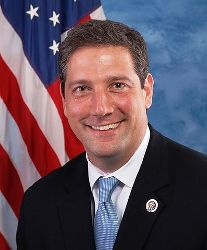Tim Ryan 2022: No Incumbent, No Problem?
In the annals of odd electoral facts, Democrats have never won a U.S. Senate seat in Ohio when an incumbent didn’t run for reelection
The announcement that 
Moderate Democratic U.S. Representative Tim Ryan is preparing to jump into this high profile race and is looking to put an end to an electoral oddity in the Buckeye State: each time a U.S. Senator from Ohio has not sought another term in the direct election era, Republicans have won the seat.
Overall, Democrats have won 18 of the 40 general and special U.S. Senate elections in Ohio since 1914, but none of the eight contests in which an incumbent did not seek an additional term:
- 1914 (Republican seat): Former state legislator and Lieutenant Governor Warren Harding defeated Attorney General Timothy Hogan by 9.6 points
- 1920 (Republican seat): Governor Frank Willis beat businessman William Julian by 18.4 points
- 1940 (Democratic seat): Cleveland Mayor Harold Burton defeated former U.S. Representative John McSweeney by 4.8 points
- 1946 special (Democratic seat): Former state legislator Kingsley Taft beat Henry Webber by 12.5 points
- 1970 (Democratic seat): U.S. Representative Robert Taft, Jr. narrowly edged former state legislator Howard Metzenbaum by 2.2 points
- 1994 (Democratic seat): Lieutenant Governor Mike DeWine coasted to a 14.2-point win over entrepreneur Joel Hyatt
- 1998 (Democratic seat): Governor George Voinovich defeated former state legislator and Cuyahoga County Commissioner Mary Boyle by 12.9 points
- 2010 (Republican seat): Former Office of Management and Budget Director Rob Portman beat Lieutenant Governor Lee Fisher by 17.4 points
In three additional cycles, incumbents ran for reelection but were defeated in the primary. Democrats also lost two of those races (1928’s special to former U.S. Senator and sitting U.S. Representative Theodore Burton and in 1968 to Attorney General William Saxbe) but did win one (behind John Glenn in 1974).
Ohio Democratic U.S. Senate nominees have surprisingly fared much better when squaring off against GOP incumbents winning six of 14 such races over the decades – knocking off Roscoe McCullough (1930, special), Simeon Fess (1934), George Bender (1956), John Bricker (1958), Robert Taft, Jr. (1976), and Mike DeWine (2006).
While Congressman Ryan may on paper be the strongest general election candidate for his party, he may yet need to navigate his way around progressive challengers on the path to the Democratic nomination next year.
Follow Smart Politics on Twitter.

“…purplish State” Not only did Buckeye vote for the losing candidate (for the sixth time since 1855, all of which for the Republican nominee), but also by about an eye-popping 8% – or about 12.4% more R relative to the national showing!
“…when an incumbent didn’t run for reelection” (Hoa!) William Bart Saxbe in fact did not stand for a second 6-year term, and his seat was won by a Democrat, albeit one who did not win & hold any ‘down-down-ticket’ positions like state representative or US representative prior to his Senate tenure.
Having left his seat in 1973, Sen. Saxbe did not run for reelection – but the incumbent in the 1974 cycle, appointed U.S. Senator Howard Metzenbaum, did seek another term. He lost the primary to John Glenn as referenced above.
Metzenbaum was the only appointed senator to successfully have won any direct US senate election, if I am correct (he actually was appointed twice, though the second one, in late 1976, was in name only, having already been elected to a full 6-year term commencing in 1977).
As of 2020, MARY Boyle is the only female Senate aspirant who was nominated by either major party.
Despite its R lean, the state’s two longest-serving senators since direct elections began have been Democrats, Glenn and “Metz”, each serving technically for 5 terms. Aside from the so-called open-seat curse afflicting the state Democrats (though methinks they retired it in 1974 with Glenn) Representative Ryan will have to “navigate” the naysayer tides in his state’s Senate elections: only in 1970 and 1934 has the party in presidential power successfully wrested a seat away from the opposing party in a midterm cycle.
The beleaguered Democrats of the state will have a chance to snag a Republican-held Senate seat (one without an elected incumbent, a category of election which they have had difficulty winning historically). Per the Constitution, an election will be held before the next standing election in 2028. My surmise is that relatively more prominent Democrats will bid for the Class 3 seat if it is held in an off-off year (2025; ‘accelerated schedule’), for then they could stand for the special election ‘from safety’.
Two Republicans seem highly unlikely to be the interim incumbent (immediately succeeding JDV, who would likely serve less than two full years). One is Attorney General David Anthony Yost, who perhaps would much prefer to be governor, and besides, the post is a significant one in its own right.
The other is Governor Richard Michael DeWine, who is capping his very long and distinguished career, as both an Ohioan and a Republican (arguably on par with four-term Governor “Jim” Rhodes and “Bob” Taft, the US Senate Majority Leader in 1953 and co-author of the Taft-Hartley Act). Should he make the ‘counterintuitive move’, though, he would become the first governor to arrange his own appointment to the US Senate since “Wendie” Anderson (MN/DFL) in the 1970s.